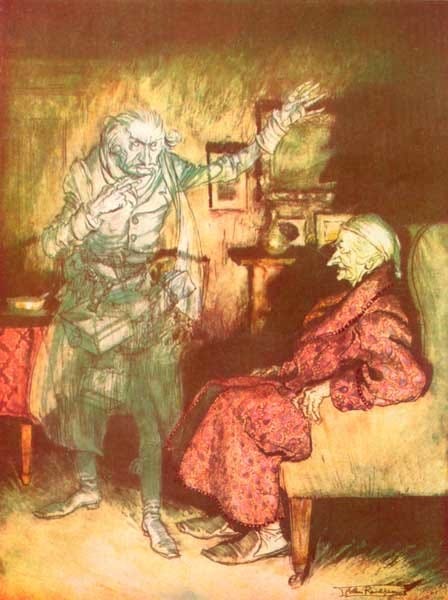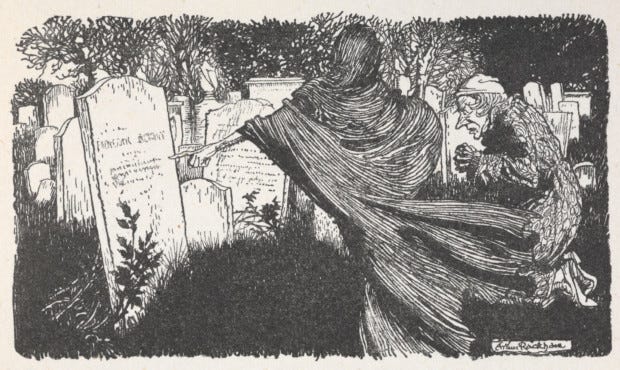Living in the Past, Present and Future
It's good advice to live in the present, but Ebenezer Scrooge shows us how that may not be enough.
Every December, I listen to an audiobook production of A Christmas Carol by Charles Dickens on my morning jogs leading up to Christmas Eve. I’ve now listened to A Christmas Carol so often that I can laugh at the jokes before they’re told and quote some parts of the story along with the narrator.
But every year, I see something in a new light, too, which is appropriate for a story about seeing things in a new light.
For the past two years, the line that has stood out the most is this phrase that Ebenezer Scrooge says just before and just after the Ghost of Christmas Yet to Come fades away:
“I will live in the Past, the Present, and the Future. The Spirits of all Three shall strive within me. I will not shut out the lessons that they teach.”
This idea caught my attention because it seems to contradict a lot of advice, ancient and modern, that teaches us to live in the present. Christianity, Buddhism, Taoism, and in poetry from ancient Rome to Robert Frost. As Master Oogway summarizes it in Kung Fu Panda, “Yesterday is history, tomorrow is a mystery. But today is a gift—that is it is called the present.”
But Ebenezer Scrooge’s vow to live in the past, present, and future does not necessarily oppose this advice. In fact, A Christmas Carol illustrates how to live a holistic life that wraps together past, present, and future. Our choice is not whether to live in the past, or the present, or the future, but it how to live in relationship with all three.
Too much of the past, present or future is a bad thing

To be sure, it is good to not dwell too much in the past or worry about the future.
We’re tempted to think too much about the past as though our family history, personal mistakes or our mistreatment by other people boxes us in and defines our future. This line of thinking can rob us of the ability to make our own choices today. Roy T. Bennett wrote, “The past is a place of reference, not a place of residence.”
But on the other hand, it’s easy to fret about the future and our goals to the extent that we daydream rather than enjoy our days. Or we become so anxious about the threat of catastrophe or gung-ho about a future goal that we hamper our ability to live the best life and prepare for the future.
The concept of living in the present aims to help us avoid those pitfalls of dwelling on the past or the future. But it is possible to think too much about the present. In fact, focusing too much on the present can lead to long-term consequences. It can lead us to pursue what is enjoyable or easy right now instead of what the past has taught us we want from the future.
At the beginning of A Christmas Carol, Ebenezer Scrooge is living only in the present. What matters is today’s profit-and-loss statement, regardless of context (the past) and consequence (the future). He is wrecking the lives of his employee, his debtors, his family and his community without caring, and he is wrecking his own life without knowing.
Confronted by the chain-bound ghost of his business partner Jacob Marley, Scrooge is made to think about “the weight and length of the strong coil” around his own spirit. “It is a ponderous chain,” Marley warns him.
The right way of living in the past, present and future

In his book The Tao of Happiness, the Taiwanese author Derek Lin explains the ancient Chinese parable of the Peng bird, which flies thousands of miles in a symbol of a personal journey toward a great goal. He points out that this story flies in the face of a common misunderstanding of Eastern philosophy:
There may be Western students of the Tao who believe that having a goal or a destination is not in keeping with the free-flowing nature of the Tao. Some may argue that goal-setting is a trap that leads to strain and strife. …
To clear up this misunderstanding, we only need to realize that being carefree does not preclude having a goal or a destination. … Carefree wandering does not mean aimless wandering. In fact, knowing where you are going and how to get there will do wonders to remove any uncertainty and anxiety from your mind.
People who have a clear vision for a future goal “exude happiness because they’ve been liberated from the pain of an empty and meaningless existence,” Lin writes. “They radiate joy because they can see themselves getting closer to the fulfillment of their dreams. Is it any surprise that these are the people who go forth feeling absolutely carefree?”
According to Lin, Chuang Tzu’s concept of carefree wandering does not mean ignoring the future—doing so would be care-less, not carefree. It also does not require disregarding the past and the wisdom it can offer.
The three ghosts who haunt Scrooge that night teach him something about the time that surrounds him. He begins to understand how and why he has changed over the years, and how he might have lived differently. He sees firsthand how his actions affect other people’s lives. He sees that his narrow focus on momentary profit has grave consequences. The experience awakens Scrooge to the fact that life is bigger than just the small corner of the present that has dominated his attention for years.

Scrooge is not going to regret the past—Marley teaches him that “no space of regret can make amends for one life’s opportunity misused.” But he will live aware of what choices made him the man he is.
Scrooge is not going to focus narrowly on the present, caring only about what he can immediately control and profit from. But he is going to live in the present. “Best and happiest of all, the Time before him was his own, to make amends in!”
Scrooge is not going to worry about the future. But knowing he will someday live there, he is going to make it the best future he can. He exclaims, “The shadows of the things that would have been, may be dispelled. They will be. I know they will!”
This is Scrooge’s lesson for us. He shows us how to live in the present by understanding the past and aiming for the future. The philosophies that encourage us to live in the moment and focus on what we can control are right to do so. But we take that wisdom too far when we care only for the moment. Like Scrooge, we can “live in the past, present and future,” not losing the lessons that any of these can teach us.



